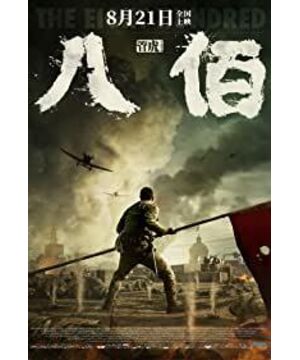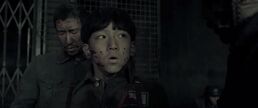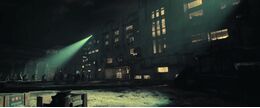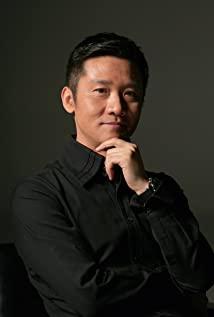Read the regular version and the IMAX version. Say your opinion. The perspective film of the motley army watching the fire from the other side is a group drama as a whole. It involves all kinds of roles: the National Guards, the motley army, the Japanese army, the special commissioner on the side of the Sixing Warehouse, as well as the Girl Scouts on the other side, journalists from various countries, patriots, etc. There is no absolute protagonist. The perspective of the opening 1 hour is basically based on the "miscellaneous army". Show their initial timidity and fear. And often jumped out of the warehouse to the concession on the other side, watching the fire from the perspective of people from all over the world. It was not until the resistance battle of the Japanese army 1 hour later that the frontal combat of the national army began to show. This perspective is quite unique. But there is also a sense of itchiness. According to the scriptwriter's routine, these motley crews were also baptized in the fire of war. The film also focuses on showing these male veterans' obsession with tobacco, alcohol, and women's "straight men's pursuit", which is more straight-man routine. In the Cantonese-style Xie Jinyuan film, each character speaks their own dialects, which makes the characters more vivid and real, which is a great job. In particular, Xie Jinyuan's Cantonese accent not only conforms to history, but also makes his heroic and steadfast style more deeply rooted in the hearts of the people. As the most famous deed in the legend of the Eight Hundred Heroes, the film can only be seen from a distance, and the film retains to the greatest extent the scenes in which the Girl Scouts send the flag and the national army raises the flag to boost morale. It even inherited and paid tribute to the Taiwan version of "Eight Hundred Heroes", focusing on the heroic spirit of the brothers in the national army who sacrificed their lives one after another to protect the national flag. On the flag-raising screen, the low and melodious "Song of the Three Principles of the People" also appeared rarely. However, the public release version of "Eight Hundred" also weakened the most important national flag of the Republic of China to the greatest extent. All flag shots are long shots, no close-up shots of any flags. The color is also very dull, like faded. A "blue sky and a white day" became a "cloudy gray day". Some of the flag shots that appeared in the trailer are also missing. It is ironic that this flag, which is defended with life, has been weakened by such an extremely low-key and secretive. For example, the Japanese line in the film "is maintaining maximum restraint". (There are spoilers involved in the ending below) Exaggeration and fiction According to historical data, the 420 strong men who guarded the Sixing warehouse suffered 37 casualties when they retreated. In the movie, it was extremely tragic, and it felt like hundreds of people were killed or injured. In history, only one suicide bomber attacked the Japanese army, and nearly ten people were exaggerated in the film. Historically, the defenders retreated across the bridge to the concession, and only ten people were injured by Japanese machine guns. The movie is exaggerated like the D-Day landings, where dozens of people were shot and killed. Even Xie Jinyuan was seriously injured by several bullets and could not stand. This is already exaggerated to the point of fictitious historical facts. Try to render a sense of tragic and solemn. As for a group of miscellaneous soldiers, shooting and killing prisoners to practice gallbladder, sending telephone lines, etc., they came out of nothing. Of course, these are also artistic creations. Deletions and deletions According to some sources, the biggest deletion in the public release version of "Yao Bai" is the opening part, which lasts nearly ten minutes. The appearances of the main characters have been deleted, resulting in an abrupt and chaotic opening of the film, and the roles are unclear. At the end of the film, the ending of the two "miscellaneous troops" who stayed behind the Sixing Warehouse and attacked the Japanese army was also left unresolved. It is impossible to distinguish whether it is a deletion factor or a deliberate blank. According to rumors, another deleted role is the "Golden Mirror" played by Ruan Jingtian. This is a Japanese among the people of the South Bank. When he saw the Japanese massacre, he shouted "No!" in Japanese, and was immediately killed by the angry people, and the body was hung on the shore. The corpse can indeed be seen in the movie. If this deletion is true, it will undoubtedly greatly weaken the criticality of the film. On the whole, Guan Hu's creation of the deeds of "Eight Hundred Heroes" is undoubtedly the most important work of his directorial career. It is also the most realistic war scene compared to the 1938 and 1975 editions of "Eight Hundred Heroes". Nearly ten flesh-and-blood characters are portrayed. However, there are also parts that are overly provocative and exaggerated historical facts. And after painful cuts, subtitles were added at the end to emphasize the role of the Chinese Communist Party in the war of resistance. It's hilarious but also helpless. In short, this public release version is still worth watching, and it is not satisfactory. Look forward to seeing the full director's cut version of "Eight Hundred" one day. Samsung and a half part of. Nearly ten flesh-and-blood characters are portrayed. However, there are also parts that are overly provocative and exaggerated historical facts. And after painful cuts, subtitles were added at the end to emphasize the role of the Chinese Communist Party in the war of resistance. It's hilarious but also helpless. In short, this public release version is still worth watching, and it is not satisfactory. Look forward to seeing the full director's cut version of "Eight Hundred" one day. Samsung and a half part of. Nearly ten flesh-and-blood characters are portrayed. However, there are also parts that are overly provocative and exaggerated historical facts. And after painful cuts, subtitles were added at the end to emphasize the role of the Chinese Communist Party in the war of resistance. It's hilarious but also helpless. In short, this public release version is still worth watching, and it is not satisfactory. Look forward to seeing the full director's cut version of "Eight Hundred" one day. Samsung and a half
View more about The Eight Hundred reviews











